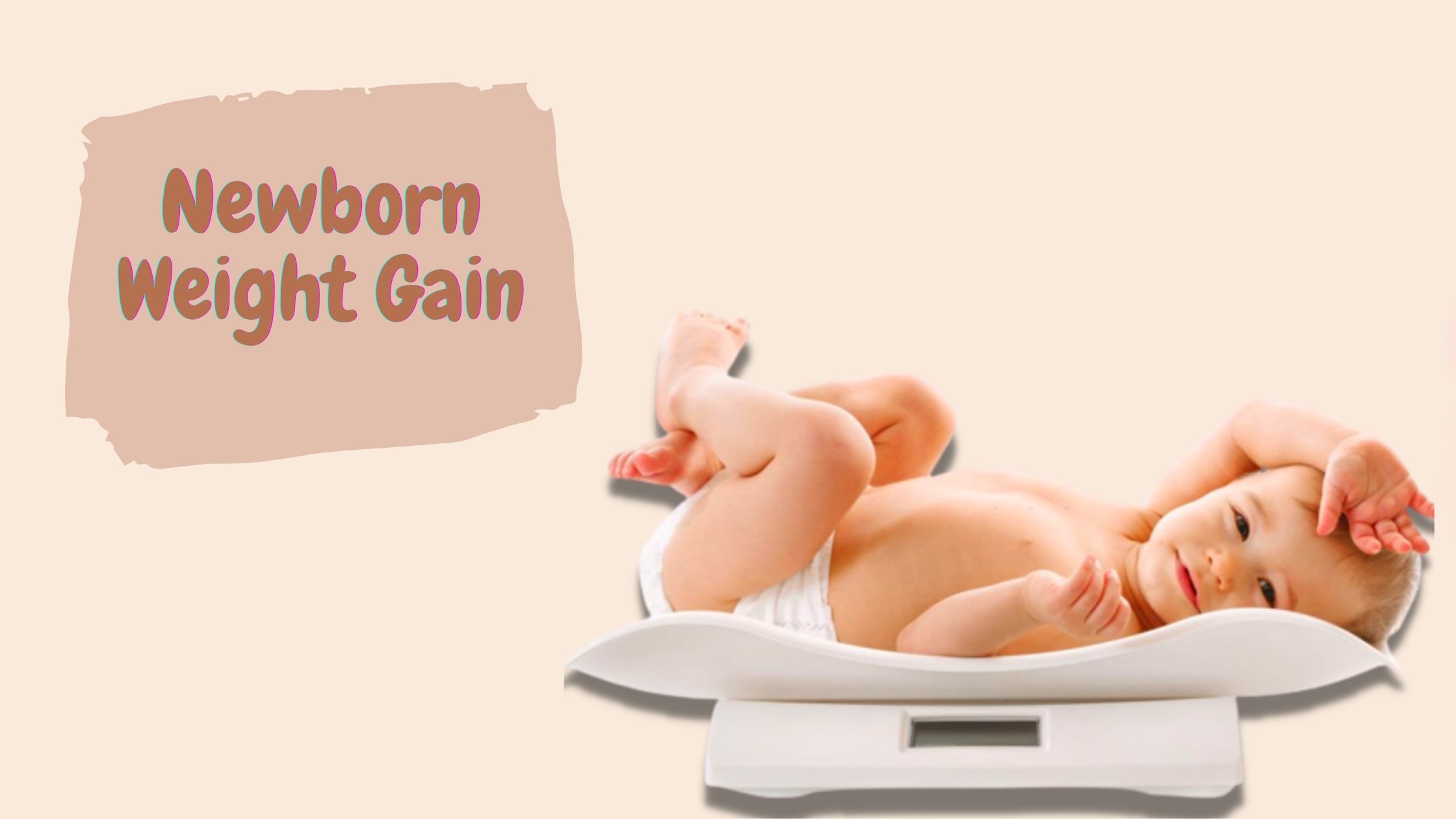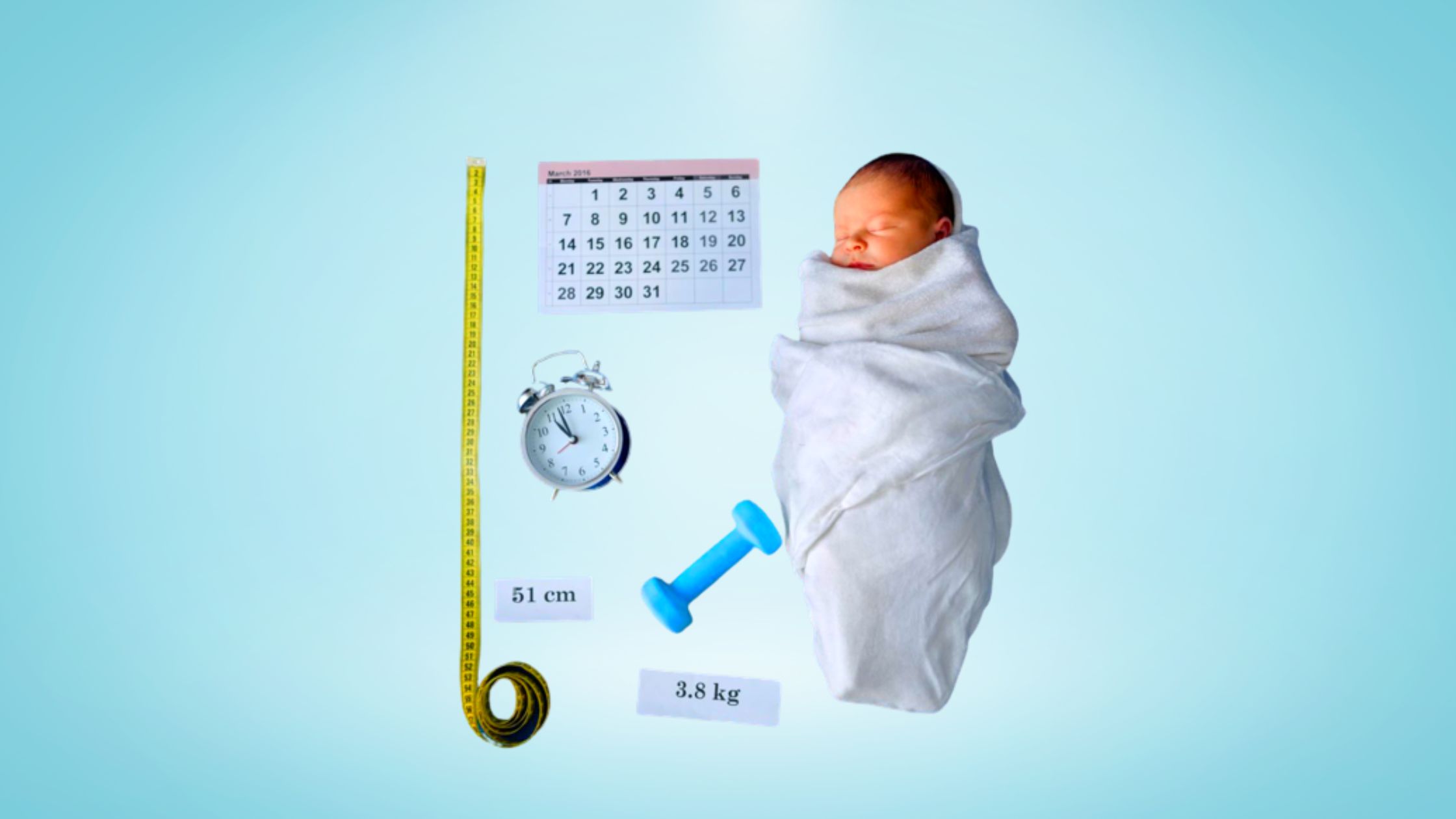Newborn Weight Gain – Get Rid Of All Your Doubts

If you are a parent, you might have come across this question several times – “ what is the weight of your baby?” The weight of your newborn is a crucial factor that decides the health of your baby. So it is natural that most parents are concerned about this question. In this article, we will be analyzing the factors that affect the weight of a newborn and how to regulate weight gain in infants.
As a parent, you might have a million questions regarding your infant’s weight. To get the answers to such questions, read this article!
Factors That Affect The Weight Of A Newborn
A normal gestation period is considered from 38 to 42 weeks. Any newborn that is born before 37 weeks is known as a premature baby and the infants that are born after 42 weeks are called postmature babies.
According to the statistics shown by the World Health Organization (WHO), the normal weight of a male newborn will be 7.8 lbs and for female babies, it will be 7.5 lbs. Several factors can affect the weight of a newborn. Some of them are provided below:

- Genetics: Genes can play a crucial role in affecting the birth weight of newborn babies. 50% of the genes in a newborn come from their mother and the rest 50% comes from the father’s gene pool. So there has been a correlation between the height and weight of parents and newborn weight gain.
- Gender: Even though the difference is minimal, the weight of a male newborn and a female newborn will be different. Male newborn tends to be heavier than their female counterparts.
- Duration of the pregnancy: The length of the pregnancy and the weight of the newborn have close links. Studies show that newborns gain weight in the latter phases of pregnancy. So if a baby takes birth prematurely, it lacks the proper growth from the womb and tends to be smaller. If a baby is born after the due date, the heavier it will be.
- The health of the mother: This is one crucial component that determines the weight of the newborn. If the mother tends to have any medical conditions, it can affect the weight of the newborn. Also, if the mother is under any medications, it can impact the newborn weight.
- Pregnancy diet: Diet during pregnancy can have a major role in determining the weight of the newborn. If the mother is malnourished and lacks any nutrients in her diet, it can influence the baby’s weight and cause lower weight. If the mother eats healthy or follows an ideal diet and is well-nourished, it can positively affect the weight of the newborn, and thereby the baby is born with a larger-than-average weight.
- Mother’s habits: The lifestyle and habits of a mother have a crucial connection with the weight of the newborn. If the mother has habits like smoking, drinking, and doing drugs, chances for the baby to become lower in weight are high.
- Order of the birth: In many instances, it is visible that the firstborns have a comparatively lower weight than the subsequent children. The second and third children tend to be having more weight than the first child.
- Stress: Recent research has shown that stress can affect the weight of the newborn. If the mother is subjected to any kind of stressful events or any kind of abuse during the pregnancy, the weight of the newborn tends to be lower than average.
- Race: Race can also play an important role in the weight of the newborn. Babies of European descent seem to have considerably more weight than babies of Asian or Indian descent.
How to check the weight of your newborn?
The weight of your newborn is measured continuously if you are still at the hospital. When the infant is discharged and 48 hours have passed, the weight is again calculated. In many cases, the weight of a newborn is measured after one week of birth and in some cases, two weeks after birth. If your baby has any medical conditions it is necessary to check its weight frequently. You can use a weighing scale to measure the weight of the infant. If you don’t have a weighing scale, you can also use some other methods. A newborn should have at least 5-7 wet diapers after the first week. Also, take care of whether the baby is feeling full after breastfeeding and demanding more. By these measures, you can take into account the ideal weight of the newborn.
Top reasons that create a slow weight gain in newborns
Many reasons can constitute slow weight gain in your newborns. A proper medical evaluation from your pediatrician can reveal the exact reason behind a slow weight gain in newborns. Still, there can be some other reasons that can result in the slower speed of weight gain in babies. Some of them are listed below:
- Improper latching position: If your baby is not properly latched on your breast, it won’t get sufficient breast milk.
- Breastfeeding not frequently: Newborns need to be breastfed for 2-3 hours throughout the day.
- Shorter sessions of nursing: Around 8-10 minutes is compulsory to breastfeed a newborn on each side. If the session of nursing is short, the chance to gain weight is reduced.
- Injury or pain in the baby: If your baby has some sort of wound or injury on its lips, it won’t be able to feed properly.
- Lag in the supply of breastmilk: If the mother produces the breast milk in a delayed manner, the baby might not get enough nutrients and thereby can develop lower body weight.
You might also like to read: How Breastfeeding Helps Prevent Obesity?
Tips to promote newborn weight gain
There are several methods you can adopt to increase the weight of your newborn. If your baby is underweight and has any complications related to that, it is better to seek consultation from your pediatrician. Otherwise, you can follow these tips to enhance the weight of your baby. Check out the list below:

🟣 Reduce feeding solid food to your baby. These foods lack calories and nutrients. Replace these foods with nutritious breast milk.
🟣 Closely observe the breastfeeding schedules. Check when your baby is demanding milk and note the cues.
🟣 Wake the baby up if the baby sleeps often amidst the breastfeeding session. Keep feeding or nursing it every 2 hours during the day and 3-4 hours during the evening.
🟣 Place your baby closer to your breasts and make sure it is covered properly during the breastfeeding session.
🟣 Massage or pump your breasts during the breastfeeding sessions as this can ensure the flow of breastmilk to your baby.
🟣 Do not switch sides too fast. Allow the baby to finish breastfeeding from one side before you go to the other side.
🟣 Make sure to sleep closer to the baby. This can also increase the frequency of nursing too.
Newborn weight gain: What to do if you are concerned?
If your pediatrician recommends you reduce the speed of your newborn’s weight gain, you can do some methods to make it happen. One thing to remember is that a baby under 1-year-old shouldn’t be put on any weight loss diets. Some of the things you can do to slow down the weight gain in your newborn are listed below:
- Engage in more breast-feeding and reduce formula-feeding
- Make use of a smaller bottle to feed the baby
- Seek medical advice from your pediatrician regarding the best formula for weight loss
- Refrain from giving too much milk to your baby
- Be aware of the breast-feeding schedule
- Do not give any formula unless your pediatrician recommends so.
- Pump or massage your breasts when feeding the baby
- Breast-feed the baby for a longer time
Signs that your newborn is eating enough
Parents are usually concerned with the weight of their babies. In the case of newborns, it is pretty hard to understand whether they have eaten enough. This is one of the most taunting things that affect the parents. Still, there can be certain signs through which you can understand whether your newborn is eating enough or not. Some of them are given below:

🟢 The baby will be active and energetic
🟢 It will show symptoms of satisfaction after breastfeeding
🟢 The cheeks of the baby will stay rounded when sucking
🟢 The end of their mouths will be moist after breastfeeding
🟢 You will have softer breasts after feeding the baby
🟢 You will feel more relaxed and sleepy after feeding the baby
🟢 You can hear the sounds of your baby swallowing
🟢 The baby will feed rapidly and will follow a rhythmic pattern of sucking
🟢 You will have plenty of wet diapers
🟢 The baby will have a steady weight gain
Conclusion
On going through the aforementioned points, one can understand various factors that affect the weight gain process of a newborn. An ideal weight for the newborn will be around 7 lbs. There can be slight variations in this based on the duration of the gestation period. Still, some factors determine the weight of your infant. This includes genetics, gender, the health of the mother, lifestyle habits, stress, etc. Along with this, several other factors create slower weight gain in infants. By identifying these issues, you can maintain a steady weight in your newborn. The article also encompasses several factors that indicate that the newborn is eating enough and healthily gaining weight. Also, there are some aspects you should consider if the newborn is unnaturally gaining weight. In any case, if you have concerns that affect the health of your newborn it is advised that you should seek the guidance of a pediatrician first.





